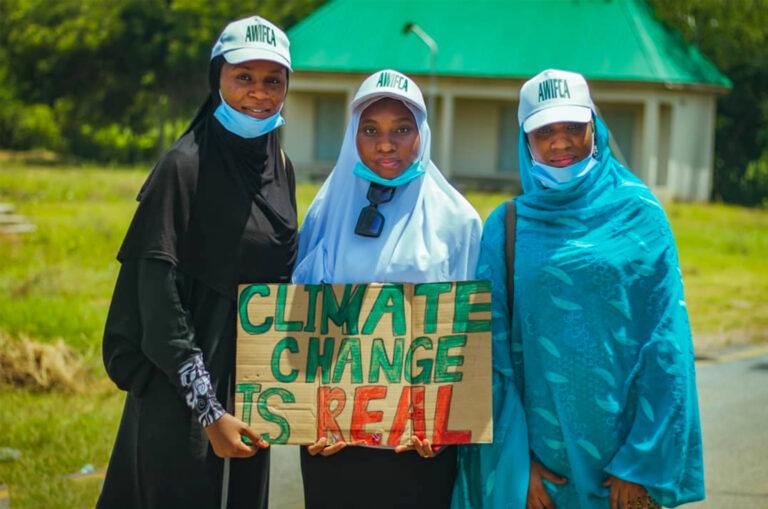Home to more than 15 million people, Kano, long known for cultivating grains and groundnuts, is now buckling under the strains of increasing desertification, erratic rainfall, and soaring temperatures. But a young female scientist, Alawiyya Musa, is at the forefront of the fight against a worsening climate crisis.
By Conrad Onyango, Bird Story Agency
For Ms Musa, who was born and raised in Kano State, Northwestern Nigeria, the devastation is personal.
“I have witnessed how climate change worsened poverty and food insecurity, especially in rural areas where people struggle to feed their families due to drought, flood, and degraded land,” she told bird in an interview.
She is, however, determined to reverse these misfortunes into opportunities that may improve the lives of residents.
Ms Musa has employed simple but powerful, community-led interventions she believes can deliver great impact.
“These issues inspired me to act, and my encounters fueled my commitment to create solutions that leave no woman, no youth, and no one around me behind,” she said, reflecting on her journey.
Building a women-led climate movement
In 2020, at the age of 31, the environmental scientist founded the Arewa Women Initiative for Climate Change Advocacy and Environmental Sustainability (AWIFCA), a women-led organisation dedicated to building climate-resilient communities in Northern Nigeria.
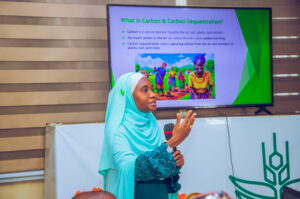
But she did not start it big. With a team of less than 10 like-minded women, they started by planting trees in their neighborhood and urging others to do the same.
For her, tree planting was more than symbolism; it was science. Trees absorb heat, improve air quality, and buffer communities against intensifying climate shocks.
“I do a lot of air quality analysis, and from what I have assessed, we have the highest level of greenhouse gas emissions,” said Ms Musa, who also coordinates the pollution control laboratory at the Kano State Ministry of Environment. She started working there at the age of 26.
Over nearly a decade, she has worked with government and NGOs, cultivated partnerships with environmental organisations across borders, and joined climate negotiation trainings across Africa under the Agnes Organisation for African Negotiators programme, a not-for-profit think tank of African experts and practitioners that provides evidence-based technical support to governments in Africa.
She is regularly invited as a stakeholder in regional and international projects.
All these have helped AWIFCA grow into a platform that trains women, youth, and people with disabilities in climate-smart livelihoods, while pushing for inclusive policy making.
Local women, local solutions
“Our projects are designed to provide climate-smart livelihood skills and to ensure that solutions address both environmental needs and social inequalities,” Ms Musa said.
Armed with a degree in Chemistry and a Master’s in Organic Chemistry, Ms Musa’s career trajectory could have remained confined to conducting research in labs or performing technical work in government ministries; however, she chose to step into on-the-ground advocacy, to bridge the gap between science and social justice.
She said she has always been convinced that local, women-led solutions were needed to confront climate change in the region where she was born and raised.
“We knew we didn’t have much funding, but we also knew there was much that needed to be done. Tree planting became our starting point because it is cost-effective, inexpensive, and delivers lasting benefits,” she explained.
Tackling deforestation, unsafe cooking
Today, the organisation has grown more than 10,000 native tree species in schools, clinics, religious centres, and marketplaces across Kano State.
After two years of the reforestation drive, her activism expanded to include a clean cooking initiative following a needs assessment spearheaded by AWIFCA. The assessment came about as a result of realising a troubling reality.
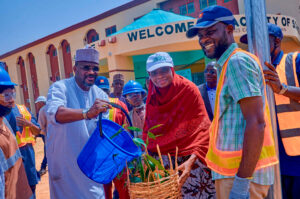
In one rural community, more than 90 per cent of households were using plastic debris, leather, or rubber as fire starters for traditional three-stone cooking stoves.
The smoke from open fires, she disclosed, had serious health and environmental consequences. It made children under five years vulnerable to respiratory illnesses, and the deforestation from cutting firewood worsened climate change in the area.
In response, AWIFCA introduced charcoal briquettes made from agricultural waste, produced using a low-emissions pyrolysis process, which was a safer, more affordable, and efficient clean cooking alternative.
“We improved the economic aspect by helping women learn to make and sell the briquettes. This way, it’s not just an environmental solution but a livelihood opportunity,” said Ms Musa.
But it has not been easy to shift what Ms Musa described as entrenched habits because of the deep-rooted cultural attachment to the traditional cooking method.
“We had to engage community leaders, pass on information, and show the health and economic benefits. Slowly, the perception began to change,” she said.
Farming against hunger
AWIFCA is currently engaging international organisations in Kano to expand the dissemination of the clean cooking technology to rural areas, especially to women who have access to the raw materials.
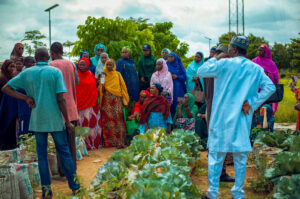
“They have it in abundance in their farmland, everywhere around them, but they don’t have the real knowledge of how to convert that waste into a cleaner option for cooking,” explained Ms Musa.
Data from the Energy Commission of Nigeria reveals that more than 60 per cent of households in Nigeria’s 200 million population are using inefficient methods and don’t have access to clean cooking technology.
With current funding from the Global Fund for the Metro African Climate Justice Movement, AWIFCA is training women and youth farmers in climate-smart agriculture, including “urban farming” techniques that make use of sacks to grow vegetables in limited spaces.
“We have received community feedback asking us for a second phase because the impact was immediate. People were harvesting their food in the middle of a food security crisis,” she said.
Earlier in August, AWIFCA partnered with the International Crops Research Institute for the Semi-Arid Tropics (ICRISAT) and the International Institute for Tropical Agriculture (IITA) to train rural farmers in regenerative agriculture.
Each participant received 25 native tree seedlings, chosen for their carbon sequestration potential and soil fertility benefits.
“Native trees have been cut down for years, but they can restore degraded land without synthetic fertilizers,” Ms Musa noted.
She is pushing to have more women participants in such programmes. It is well-documented that in Africa, women are disproportionately affected by the climate crisis.
Shaping climate policy
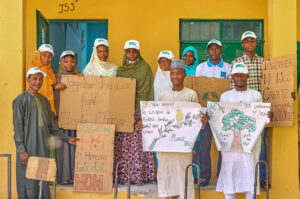
Another recent major win for Ms Musa is her growing influence in policy-making decisions. She was a stakeholder from the preparatory stage to the launch of Kano State’s new climate change policy, unveiled in August 2025, and AWIFCA helped review its gender components.
“This is significant because it means that in the coming years, we can expand programmes that combine economic empowerment with environmental resilience,” she said.
While she takes pride in making significant milestones, including being one of the few women in northern Nigeria’s climate space, the journey has not been easy. She said, convincing women to get into climate action is challenging.
She observed that many people, particularly women, still dismiss climate change as western propaganda, and that shifting this mindset has been a difficult task.
Inspiring the next generation
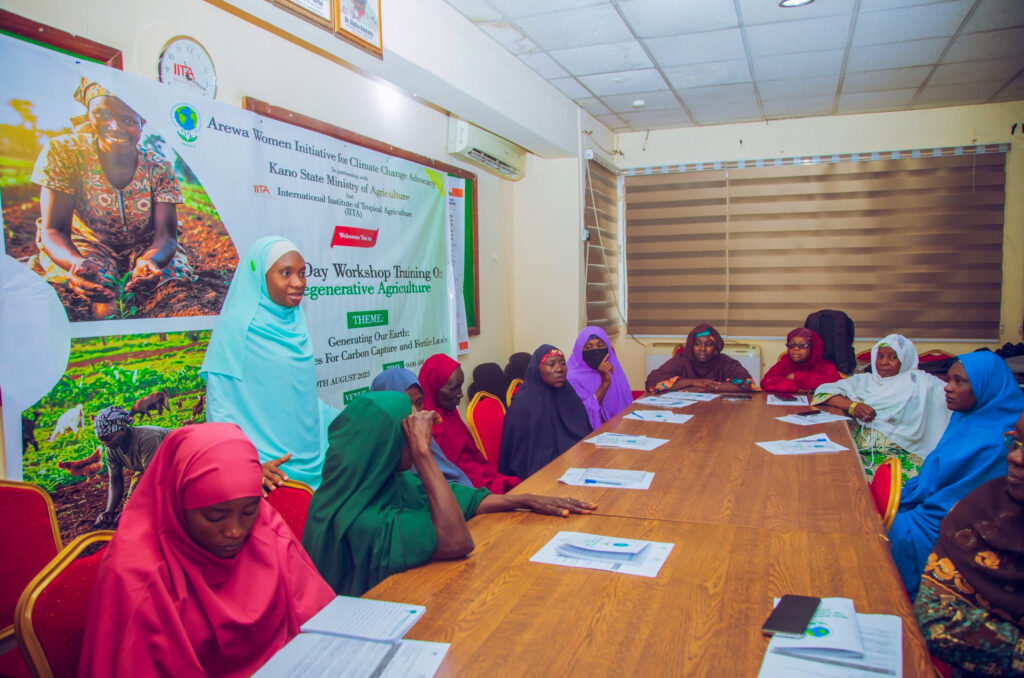
Ms Musa sees a ray of hope from the next generation of young people, who are the largest demographic in Nigeria.
“Now, each day, more young people reach out to me showing interest in what we are doing,” she said with a quiet pride.
Today, AWIFCA has more than 300 members, over 80 per cent are women. This growth, according to Ms Musa, signals a cultural shift in who leads climate action in a region where traditional norms can restrict women’s public roles.

